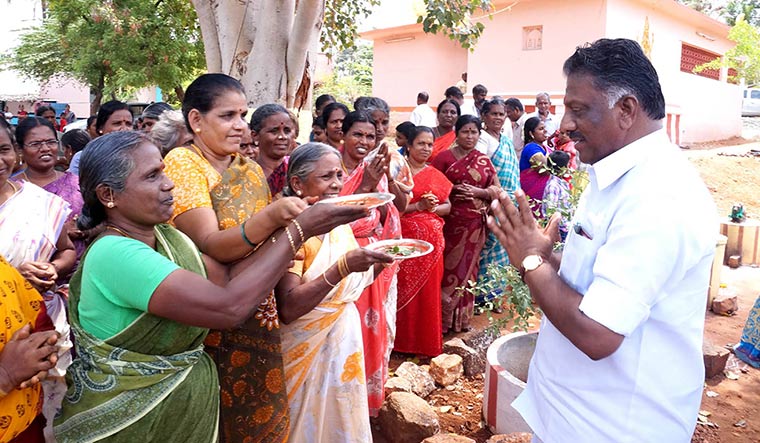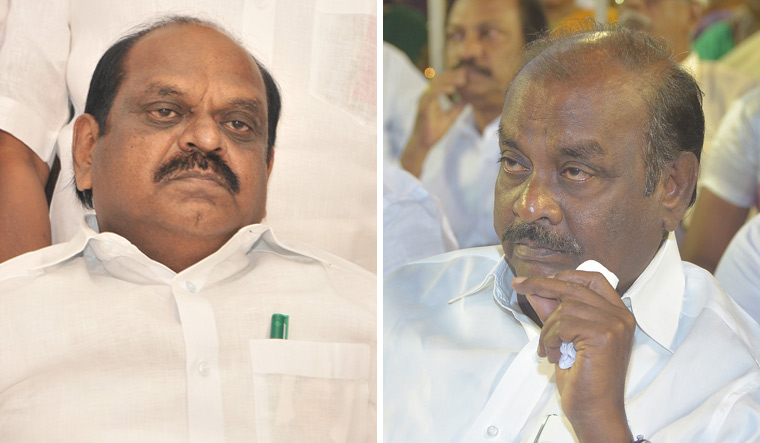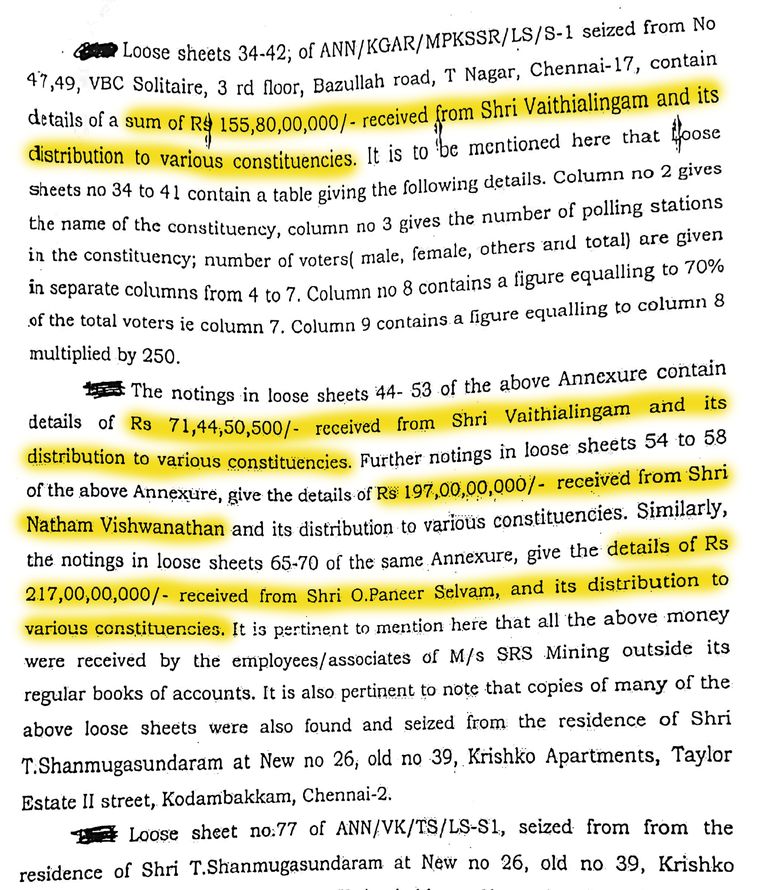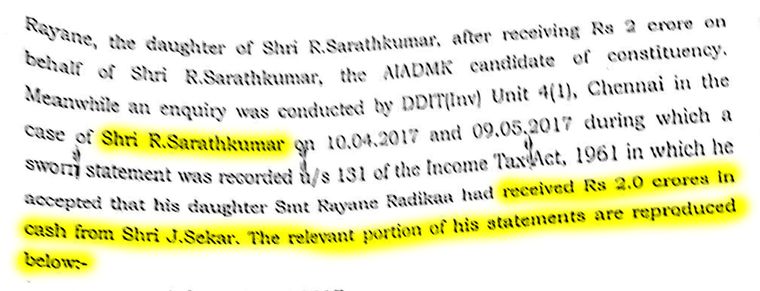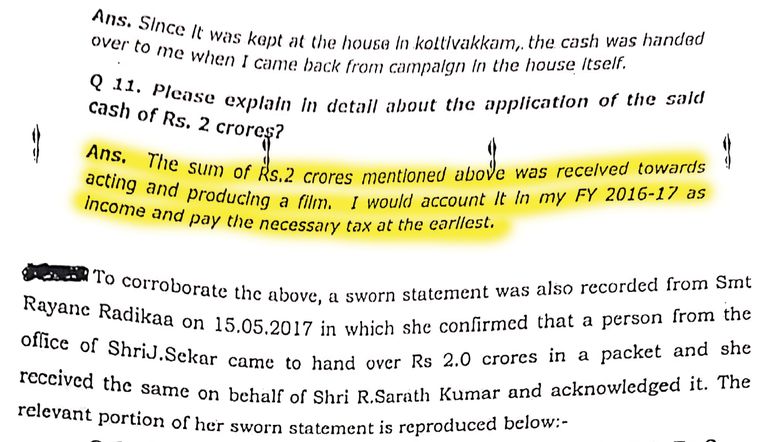IN TAMIL NADU, the tradition of buying votes continues to flourish. With elections in 39 Lok Sabha constituencies and byelections in 18 assembly seats round the corner, the Election Commission and income tax department officials have seized a record Rs 137 crore of unaccounted cash from across the state.
The single-largest haul was the Rs 11.53 crore seized from properties linked to DMK treasurer Durai Murugan, whose son Kathir Anand is the party candidate in Vellore. Durai Murugan alleges that the Central and state governments are playing dirty tricks. “The ruling AIADMK is bribing voters. But the DMK is being targeted,” said a leader.
It was the DMK, however, that perfected the art of distributing cash for votes. In 2009, in the run-up to the assembly bypoll in Thirumangalam in Madurai district, the party allegedly distributed envelopes containing voting slips and Rs 5,000 in cash along with the newspaper. The experiment was so successful—the DMK won by nearly 40,000 votes—that it came to be known as the ‘Thirumangalam formula’.
Then the AIADMK scaled up the cash-for-votes enterprise. In the assembly elections in 2016, it allegedly gave Rs 250 each to voters across the state, which helped the party return to power by winning 134 of 234 seats. Documents accessed by THE WEEK show that as much as 70 per cent of voters in some constituencies were bribed by AIADMK leaders. Surprisingly, the Election Commission is yet to take any action.
On May 9, 2017, the principal director of income tax (PDIT) sent a note to the director-general of income tax investigation, detailing the way cash was distributed to voters in the run-up to the assembly polls. The note cites documents seized in December 2016 from the Chennai offices of SRS Mining, in which controversial businessman J. Sekar Reddy is a partner.
The PDIT wrote that SRS Mining “sourced” Rs 227.25 crore from housing minister R. Vaithilingam, Rs 197 crore from electricity minister Natham Viswanathan and Rs 217 crore from public works minister O. Panneerselvam. “The money so received (Rs 641.25 crore) was redistributed, apparently to various AIADMK candidates, by the employees and associates of SRS Mining and its partners,” said the note.
The preparations for bribing voters apparently started in 2015, when it became clear that the popularity of the AIADMK government led by chief minister J. Jayalalithaa was on the wane. By October that year, the party had prepared a detailed chart based on the voters list in each constituency.
“[Documents seized] contain a table giving the following details,” said the note. “Column 2 gives the name of the constituency. Column 3 gives the number of polling stations in the constituency. Number of voters—male, female and others—and their total are given in columns 4 to 7. Column 8 contains a figure equalling 70 per cent of total voters. And column 9 contains a figure equalling [the figure in] column 8 multiplied by 250.”
The voters were profiled based on their family background, financial requirements and political allegiances. Caste, community and the number of votes in each household were then factored in to decide on the amount to be paid.
“[The money given by the three AIADMK ministers] were received by the employees/associates of SRS Mining outside its regular books of accounts,” said the PDIT note. “It is also pertinent to note that copies of many of the [documents] were seized from the residence of [SRS Mining employee] T. Shanmugasundaram in Chennai, [and they give] details of cash amounting from Rs 25 lakh to Rs 1 crore paid to various candidates.”
THE WEEK’s investigation revealed that bundles of cash were transported, at least three months before polling, to 226 assembly constituencies. The money was kept in houses owned by the AIADMK’s ward members and grassroots leaders.
“It was split, booth-wise, in each constituency,” a former AIADMK minister told THE WEEK. “Weeks before the election, it was distributed to party functionaries in charge of the booths. On May 14, two days before polling, they visited each household like a neighbour and gave Rs 250 per vote. If there were four votes in a house, we gave Rs 1,000.”
In some constituencies, AIADMK leaders paid the visits as part of their morning walk. In some others, voters were called after 10pm. “We ensured that the money reached every voter whom we thought would vote for us,” said the former minister.
Documents seized from Shanmugasundaram’s house had acknowledgements from AIADMK candidates who received funds. “One such sheet carries the acknowledgment of Ms Rayane, daughter of R. Sarathkumar,” said the PDIT note. An actor-turned-politician, Sarathkumar had contested from Tiruchendur under the AIADMK symbol.
In April and May 2017, the IT department recorded the sworn statements of both Rayane and Sarathkumar, in which they admitted to having received Rs 2 crore from J. Sekar Reddy in May 2016. Sarathkumar said the transaction was not recorded in the books, and that he learnt of it while he was campaigning in Tiruchendur. “The cash was received by my daughter… who informed my staff about it,” he told IT officials. “The sum of Rs 2 crore was received towards acting and producing a film. I would account it as income in 2016-17 and pay the necessary tax at the earliest.”
THE WEEK tried contacting Shanmugasundaram, but his whereabouts remain unknown. Sarathkumar suggested that the issue mentioned in the PDIT note was not relevant to the bribery charges. “My income tax matters have been explained to the concerned officers,” he informed THE WEEK.
The PDIT note cites the money received by Sarathkumar as clinching evidence of the money trail. “The information has been communicated to the director-general of investigations (IT department) for onward transmission to the Central Board of Direct Taxes for intimating the Election Commission of India,” the note said.
A senior IT official in Chennai told THE WEEK that the department had raided properties belonging to “several VIPs” to corroborate their findings. “We found strong evidence of the AIADMK having spent huge money to bribe voters,” said the official. “The IT cases against the VIPs are ongoing. But it is for the Election Commission to take action as regards to bribing of voters.”
The commission is yet to act. It has not even acknowledged THE WEEK’s RTI queries on the matter, which were filed on February 14.
When asked about the bribery allegations against him, Sekar Reddy said the IT department had not seized any incriminating material from properties linked to him. “The IT department never made inquiries on such lines,” he told THE WEEK. “The panchanama [a legal statement prepared after a seizure or arrest] given to me after the raids also do not mention this. I have already clarified that I do not have the habit of keeping a diary. So any note about these details in my account books is not true.”
When asked about the PDIT note, Natham Viswanathan said, “There is no truth in it. We did not distribute cash. In 2016, the people wanted Amma (Jayalalithaa) to continue her welfare government. So we were voted back to power.”
Vaithilingam and Panneerselvam have not responded to THE WEEK’s queries. “I am campaigning. I do not have time to talk now,” said Vaithilingam. Ashok Thomas, public relations officer in the deputy chief minister’s office, said he had forwarded the queries to Panneerselvam.
The Election Commission had registered 101 cases of poll-related bribery across 98 constituencies in May 2016. Most of the cases are in limbo now. It had also countermanded voting in three constituencies, where it suspected that voters had been bribed. All three constituencies were won by the AIADMK in bypolls held later that year.
“In some places, the bribe went up to Rs 1,000 per vote,” said D. Ravikumar of Viduthalai Chiruthaigal Katchi, who is contesting this Lok Sabha elections from Villupuram constituency as part of the DMK-Congress alliance. “The AIADMK distributed cash to win the 2016 assembly elections. We all witnessed it. I had contested from the Vanur assembly seat in Villupuram then. I was not able to fight the might of money.”
Perhaps, the voters themselves are to blame. The blockading of a street in the run-up to the Pudukottai assembly bypoll in 2012 is a case in point. When the police turned up to disperse the crowd, they were shocked to hear demands for money. People complained that their relatives nearby had received cash for votes, and that they were left out.
Over the years, the malaise has only worsened. “It is not just the downtrodden [who are demanding money],” said veteran journalist R. Ramasubramanian. “People belonging to the middle and upper middle classes have also started expecting cash. Politicians are looting our money, they say. So what is wrong in accepting what is basically our money?”



